Unit13 We are trying to save the earth
新人教版九年级英语下册Unit 13 We’re trying to save the earth!要点详解
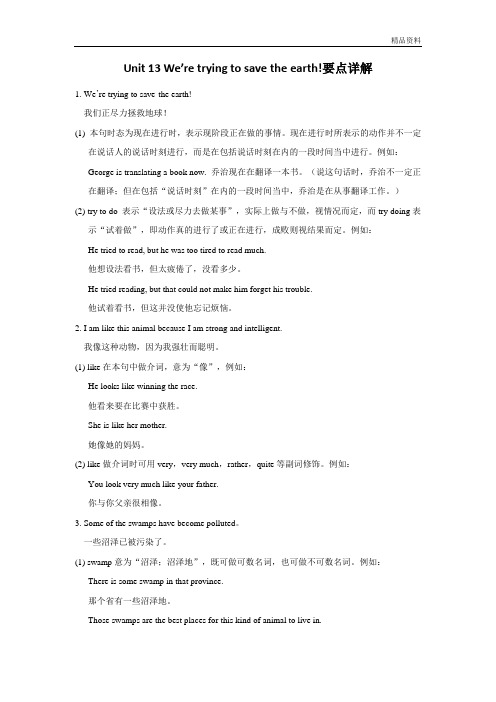
Unit 13 We’re trying to save the earth!要点详解1. We’re trying to save the earth!我们正尽力拯救地球!(1) 本句时态为现在进行时,表示现阶段正在做的事情。
现在进行时所表示的动作并不一定在说话人的说话时刻进行,而是在包括说话时刻在内的一段时间当中进行。
例如:George is translating a book now. 乔治现在在翻译一本书。
(说这句话时,乔治不一定正在翻译;但在包括“说话时刻”在内的一段时间当中,乔治是在从事翻译工作。
)(2) try to do 表示“设法或尽力去做某事”,实际上做与不做,视情况而定,而try doing表示“试着做”,即动作真的进行了或正在进行,成败则视结果而定。
例如:He tried to read, but he was too tired to read much.他想设法看书,但太疲倦了,没看多少。
He tried reading, but that could not make him forget his trouble.他试着看书,但这并没使他忘记烦恼。
2. I am like this animal because I am strong and intelligent.我像这种动物,因为我强壮而聪明。
(1) like在本句中做介词,意为“像”,例如:He looks like winning the race.他看来要在比赛中获胜。
She is like her mother.她像她的妈妈。
(2) like做介词时可用very,very much,rather,quite等副词修饰。
例如:You look very much like your father.你与你父亲很相像。
3. Some of the swamps have become polluted。
一些沼泽已被污染了。
新版九年级下册unit13We-are-trying-to-save-the-earth!重点

______________________________________________________________________________________________________________Unit 13 We are trying to save the earth!一、重点词组:1.at the bottom of the river在河床底部2. be full of the rubbish充满了垃圾3. throw litter into the river把垃圾扔入河中4. play a part in cleaning it up尽一份力把它清理干净5. land pollution土地污染6. fill the air with black smoke使空气中充满了黑烟7. cut down air pollution减少空气污染 8. make a difference产生影响9. shark fin soup鱼鳍汤 10. at the top of the food chain处于食物链的顶端11. in the last 20 to 30 years在最近的20到30年间12. environmental protection groups around the world 全球环境保护组织13.develop laws 建全法律 14.the sale of shark fins 鱼鳍买卖15. take part in 参加 16. can’t afford to do sth 负担不起做某事17. take action 采取行动 18. turn off 关掉 19. pay for付费 20. add up累加21. use public transportation 使用公共交通 22. recycle books and paper 回收书和废纸23. use paper napkins 使用纸巾 24. turn off the shower 关掉喷头25. ride in cars 开车出行 26. throw away 扔掉27. put sth to good use 好好利用 28. pull…down拆下29. an old boat turned upside down一艘倒过来的旧船30. be an inspiration to sb 成为…的榜样 31. set up a website 建立一个网站32. a “metal art” theme park 一个“金属艺术”主题公园33. be known for 以…而闻名 34. not only…but also…不仅…而且…二、用法集萃:1.try to do sth.尽力做某事2.play a part in doing sth参加做某事ed to do sth过去常常做某事4.instead of doing sth代替做某事5.start doing sth 开始做某事6.remember to do sth记得去做某事7.can’t afford to do sth担负得起做某事8.by doing sth通过做某事9. Be good at doing sth擅长做某事10.plan to do sth计划做某事11.would rather … than …宁愿……而不愿……后面跟动词原形12.prefer to … rather than …宁愿……而不愿……后面跟动词原形13. make of 当原材料制成成品后,原材料未经任何化学变化,仍保持原有性质。
人教版九年级英语Unit 13 We're trying to save the earth! 全单元教案

Unit 13We're trying to save the earth!本单元围绕环境保护的话题,并用主题图片表现噪音污染、空气污染、水污染等内容,目的是为了让学生对环境的破坏有一个直观的认识,从而激发学生强烈的社会责任感和对未来发展的思考。
Section A的重点是让学生掌握与环境污染和环境保护相关的词汇和句型,同时引导学生关爱动物、保护环境。
教学难点是让学生学会正确使用连词和结合生活实际讲述如何保护环境。
Section B在Section A所学的基础上,进一步谈论如何保护环境。
教学重点是让学生了解环境保护的方式,并落实到积极的行动当中,同时还有阅读策略和写作技巧的训练。
教学难点是让学生在阅读2a文章之后,根据所给词根找出衍生出的不同词汇,并理解前缀和后缀的不同用法。
The First Period—Section A(1a-2d)Teaching Important Points【教学重点】Key words & phrases:litter,bottom,fisherman,coal,ugly,advantage,cost,wooden,plasticnoise pollution,air pollution,water pollution,be full of,play a part in,turn…into,cut down air pollutionKey sentences:1.Even the bottom of the river was full of rubbish.2.It used to be so clean.3.Everyone in this town should play a part in cleaning it up.4.The air is badly polluted because there are more cars on the road these days.5.The air has become really polluted around here.6.We're trying to save the earth.Key structure:should+do;used to+do;have/has+done;be+done;be+doinge.g.Everyone should help to clean up the river.The air has become really polluted.I used to be able to see stars in the sky.The air is badly polluted.Teaching Difficult Points【教学难点】★Practice the structures to talk about pollution and environmental protection.Teaching Aids【教学工具】A tape recorder,CAI or multimedia courseware.Teaching Steps【教学过程】★Step 1Leading in【新课导入】1.Greeting2.Discussion and reviewDiscuss with the students,like this:T:What kinds of pollution are there these days?S:…T:What causes the pollution?S:…3.Review the words and expressions about the topic.★Step 2Cooperative inquiry【合作探究】1.Finish the task in 1a①Show pictures or play videos about pollution and talk about the pollution.②Read these phrases in 1a.Look at the pictures in 1a and say what they see in the pictures.Write down the words and add more words.③Ask students to say out their words in each kind of pollution.2.Finish the task in 1b①Read the instructions.Get the students to read the contents in the chart and think of what they will fill in the blanks.②Play the recording for the first time.Students listen and fill in the words.③Play the recording a second time.Ask them to check the answers.Then ask the questions.Students answer with full sentences.④Ask more questions to help students learn more details.Then play the recording for the students to role-pay the conversation.3.Finish the task in 1c①Show the key words of the conversation.Ask students to retell the contents in the chart.Like this:What:dirty;bottom,rubbish;fishWhy:littering,putting wasteHow:write to,close down;help to clean up②Read aloud the model dialogue in 1c.Then in pairs,do the oral practice with more words.③Ask two pairs to perform in class.4.Finish the tasks in 2a-2b①Use PPT or pictures to show the four kinds of pollution.Get the groups of students to havea competition to say words about the pollution one by one.land pollution:…air pollution:…noise pollution:…water pollution:…②Get the students to write down these words in their notebooks.③Play the recording for the first time.Students listen and circle the kinds of pollution.Check answers with the class.④Read the sentences in 2b.Predict the contents they will fill in.Play the recording.Students listen and complete the sentences.⑤Play the recording again.Check the answers with the whole class.5.Finish the task in 2c①Read the sample conversation in 2c.Then Read the listening materials and discuss in pairs what causes the two kinds of pollution.②Students work in pairs,making dialogues.③Ask three pairs to role-play their conversations to the class.6.Finish the task in 2d①Talk about the picture in 2d.Ask:What are your ideas for solving the air pollution/waste pollution problem?Present the new words in the conversation.Such as,coal,advantage,wooden,plastic,takeaway,bin,…②Read the conversation in 2d quickly.Find out the problems about environmental pollution in the dialogue.③Read the conversation again.Ask the students to find the ways to solve the problems of air and waste pollution.④Read aloud the conversation by the recording.⑤Learn the useful expressions:What are your ideas for doing…To cut down air pollution,we should…So together,our actions can make a difference and…⑥Role-play or read the conversation in pairs until fluently.★Step 3Homework1.What are your ideas for solving the waste pollution problem?2.Write the words about the four kinds of pollution.3.Translate the following sentences into English.(1)我们正在想办法拯救地球。
unit 13we_are_trying_to_save_the_earth.

2b Listen again and complete the sentences.
1. The air is badly polluted because there are ________on more car the road these days. 2. Factories that burn coal also pollute ______ the air with a lot of black smoke.
litter people are throwing _____into what caused the the river. Factories are putting problem? waste into the river. _______
We should write to thegovernment ________ How should the close down the and ask them to ___________ problem be factories. everyone should help solved? clean up the river. ________to
2d Role-play the conversation.
Interviewer: Jason and Susan, what are your
ideas for solving these problems?
Jason: Well, to cut down air pollution, we should
Water pollution
Factories put litter into the river.
litter v. 乱扔 n. 垃圾;废弃物 (=rubbish; waste)
人教版九年级英语下册Unit 13 We’re trying to save the earth!S

2.It's good for hetrlth and it doesn’t cost anything!它有利于信康,并且它不花费任何东
西!(教材第98页) be good for意为“对……有益”,反义词组be bad for意为“对……有害”。 辨析:be good for,be good at与be good with
【中考链接2】
1. (2014山东威海中考模拟) Why don't you__A _your
friends to the party? I want to meet them.
A bring
B. brings
C.leaves
D Mr Li. I A my
Unit 13 We’re trying to save the earth!
Section A 课堂精讲
【语法点精讲】
1.(1)We're trying to save the earth!我们正在 竭力拯救地球!
(2)People are throwing litter into the river.人们 正在把垃圾扔进河里。
(2) 表示现阶段正在进行的动作或存在的状态。 如: They are studying hard this term. 他们这个学期学习一直很努力。 (3)come,go,leave,arrive,start等动词用现在 进行时表示将来。 如:The bus is coming soon. 车不久就会来了。 (4)在由while(当……时候)引导的状语从句中,动
English homework at home.
-Don’t forget it to school tomorrow.
人教版九年级英语下册Unit 13 We’re trying to save the earth!

答案: 1. 垃圾 2. 底部 3. fisherman 4. advantage
5. plastic 6. wooden
Ⅱ. 短语连线 1. be full of 2. turn. . . into. . . 3. cut down 4. make a difference 5. lead to
【学以致用】
①(2014·十堰中考)—Smart phones are more and more popular
答案: 1. We’re trying 2. used to be 3. are throwing
4. 这个城镇的每个人都应该参与到清理之中!
Everyone in this town
a part in cleaning
it up!
5. 这周围的空气真的已经污染了。
The air
really polluted around here.
【自主归纳】
(1)advantage名词, 意为“优点; 有利条件”, 常用复数形式。
反义词为
, 意为“缺点; 不利条件”。
(2)advantage的常用搭配有the advantage(s) of意为“……的优
点”, take advantage of sb. 意为“占某人便宜”, take the
hands.
A. experience B. advantage C. dream
答案: take; the advantage of
this as to have big D. change
3. cost v. 花费 【语境领悟】 *It’s good for health and it doesn’t cost anything! 它对健康有好处, 并且不花任何钱! *I spent a lot of money on that holiday. 那次度假花了我一大笔钱。 *I think it’s a great idea that you now have to pay for plastic bags. 现在你得付钱买塑料袋, 我认为这是个好主意。 *It takes me forty minutes to do my homework. 做作业花费我四十分钟。
人教版英语九年级全册单元unit 13 知识点+测试卷+思维导图

Unit 13 We are trying to save the earth.1.重点词汇:bottom, fisherman, coal, advantage, industry, law, gate, bottle, president, work, metal...2. 短语归纳:1. be full of 充满2. get in the shower 在洗淋浴3. leave sth in sp 把某物留在某地4. by the time... 到……的时候;到……之前5. be late for class 上课迟到6. go off 发出响声7. brush one’s teeth 刷牙8. give sb a lift 捎某人一程9. be about to 即将……;正要……10. stare at 盯着看11. in disbelief 疑惑地;不相信地12. take off (飞机等)起飞13. show up 赶到14. get a chance to do sth 得到一个做某事的机会15. leave for sth 动身去某地16. sell out 卖光17. lose weight 减肥18. run out of 用完3. 必背典句:1. We are trying to save the earth. 我们正在努力拯救地球。
2. The river used to be clean. 这条河过去是干净的。
3. The air is badly polluted. 空气受到严重污染。
4. No scientific studies have shown that shark fins are good for health.没有科学研究表明鱼翅对健康有益。
4.语法知识:英语句子成分分析组成句子的各个部分叫做句子成分。
它包括:主语、谓语、宾语、定语、状语、表语和宾语补足语等。
[知识]九年级英语Unit13课文翻译
![[知识]九年级英语Unit13课文翻译](https://img.taocdn.com/s3/m/2ab07b3259fb770bf78a6529647d27284a733744.png)
Unit13 We’re trying to save the earth !Section A 2d采访者:贾森和苏珊,对于解决这些问题,你们有什么想法?贾森:为了减少空气污染,我们应该乘坐公共汽车或者地铁,而不是开车。
苏珊:是的,或者骑自行车。
骑自行车还有别的好处,它对健康有益而且不用花钱。
采访者:好主意!那么,垃圾污染呢?苏珊:嗯,我认为一些生活小事有助于减少垃圾污染,比如自带袋子去购物。
我去年就这样做了。
贾森:我也是。
还有,我买外卖食品的时候,从来不拿一次性木筷或者塑料叉子。
我用家里的餐具。
苏珊:还要把垃圾扔进垃圾桶,保持公共场所的整洁和美丽,(这是)为了每个人。
采访者:所以,我们一起行动,就能影响他人,创造一个更美好的未来。
Section A ,3a拯救鲨鱼很多人都听说过鱼翅羹。
这道昂贵又著名的菜在中国南方特别流行。
但是每次当你喝鱼翅羹的时候,你是否意识到你杀了一整只鲨鱼?当人们捕捉到鲨鱼的时候,他们切掉鲨鱼的鱼鳍,然后把它们扔回大海。
失去鱼鳍的鲨鱼再也不能再水里游,会慢慢死去。
这种做法不仅残忍,而且对环境有害。
鲨鱼处于海洋生态系统食物链的顶端,如果他们的数量下降得太多,将会给所有的海洋生物带来危害。
很多人认为鲨鱼永远不会濒临灭绝,因为他们是食物链的最强者。
但事实上,每年有七百万的鲨鱼被捕杀和交易。
在过去的20年到30年,某些品种的鲨鱼数量下降了超过90%。
世界各地的环保组织,如野生救援协会和世界自然基金会,都在向公众宣讲“猎翅的(残忍)行为。
他们甚至已经呼吁政府立法停止鱼翅的销售。
到目前为止,没有任何科学研究表明,鱼翅对健康有好处,那么为什么要吃他们呢?帮助拯救鲨鱼吧!Section B , 2a重新思考重新使用,重新利用你经常扔掉你不在使用的东西吗?你是否曾想过这些东西还能很好地重新利用?如果你有一个充满创意的头脑,没有东西是废品。
你可能从来没听说过艾米.海斯,但她是一个非常不寻常的女性。
UNIT13Weretryingtosavetheearth原文与翻译

UNIT13We'retryingtosavetheearth原文与翻译《牛津初中英语》充分体现了《新课标》的诸多精神。
该教材具有两大特点。
下面是小偏整理的UNIT13We'retryingtosavetheearth 原文与翻译,感谢您的每一次阅读。
UNIT13We'retryingtosavetheearth原文与翻译SectionA1bListenandcompletethesentences.Tony:Hey,Mark,maybewecouldgoswimmingintheriverlaterthi safternoon.Mark:Idon’tthinkIwanttogo,Tony.Tony:Whynot?Mark:Iwastherelastweekendandtheriverwasreallydirty.Eventh ebottomoftheriverwasfullofrubbish,andtherewerenomorefishforf ishermentocatch.Tony:Noway!Itusedtobesoclean.Infact,ithasalwaysbeentheni cestriverinthistown.Mark:Notanymore.Ithinkpeoplearethrowinglitterintotheriver. Factoriesarealsoputtingwasteintotheriver.Tony:That’sterrible!Weshouldwritetothegovernment.Theys houldclosedownthefactories.Mark:Goodidea!ButIthinkeveryoneinthistownshouldhelptocl eanuptheriver,too.Everyoneshouldplayapart,notjustthegovernm entSectionA2aListentotheinterview.thekindsofpollutionthatJasonandSusan talkabout.Interviewer:T odaywe’retalkingtoJason andSusanaboutenvir onmentalproblems.JasonandSusan,canyoutellusaboutsomeofth eproblemsyou’veseen?Jason:Ithinkoneproblemisthattheairisbadlypolluted.Ihardlye verseeblueskiesanymore.Susan:Yes,andIusedtoseethestarsclearly.Interviewer:Whatdoyouthinkhascausedthisproblem?Susan:Well,therearemorecarsontheroadthesedays.Jason:Andfactoriesthatburncoalalsopollutetheairwithalotofb lacksmoke.Interviewer:Whatotherproblemsdoyousee?Susan:Iguessthere’stoomuchrubbishandwasteinthestreets.Jason:Yes!Everydaypeoplearethrowingawaythingslikewoode nchopsticks,plasticbowlsandplasticbags.Susan:They’realsolitteringinpublicplaces,forexample,durin gpicnicsinparks.Thisisturningbeautifulplacesintouglyones.Interviewer:You’reright.Theseareseriousproble msforourenv ironment.Next,let’stalkaboutthethingswecandotohelp.SectionA2bListenagainandcompletethesentences.Interviewer:T odaywe’retalkingtoJasonandSusanaboutenvir onmentalproblems.JasonandSusan,canyoutellusaboutsomeofth eproblemsyou’veseen?Jason:Ithinkoneproblemisthattheairisbadlypolluted.Ihardlye verseeblueskiesanymore.Susan:Yes,andIusedtoseethestarsclearly.Interviewer:Whatdoyouthinkhascausedthisproblem?Susan:Well,therearemorecarsontheroadthesedays.Jason:Andfactoriesthatburncoalalsopollutetheairwithalotofb lacksmoke.Interviewer:Whatotherproblemsdoyousee?Susan:Iguessthere’stoomuchrubbishandwasteinthestreets.Jason:Yes!Everydaypeoplearethrowingawaythingslikewoodenchopsticks,plasticbowlsandplasticbags.Susan:They’realsolitteringinpublicplaces,forexample,d urin gpicnicsinparks.Thisisturningbeautifulplacesintouglyones.Interviewer:You’reright.Theseareseriousproblemsforourenv ironment.Next,let’stalkaboutthethingswecandotohelp.SectionA2dRoleplaytheconversation.JasonandSusan,whatareyourideasforsolvingtheseproblems?Well,tocutdownairpollution,weshouldtakethebusorsubwayin steadofdriving.Yeah,orrideabike.Thereareotheradvantagesofbikeriding.It'sg oodforhealthitdoesn'tanythingGreatideas!Whataboutwastepollution?Mmm,Ithinksimplethingslikebringingabagtogoshoppingcan help.Istarteddoingthatayearago.Me,tooAlso,Inevertakewoodenchopsticksorplasticforkswhen Ibuytakeawayfood.Iusetheonesathome.Andremembertothrowrubbishinthebinsandkeeppublicplace scleanandbeautifulforeveryone.Sotogether,ouractionscanmakeadifferenceandleadtoabetter future!SectionA3aReadthepassageaboutsharksandcompletethefactsheetbelow.SavetheSharks!Manyhaveheardofsharkfinsoup.Thisfamousandexpensivedis hisespeciallypopularinsouthernChina.Butdoyourealizethaty ou’r ekillingawholesharkeachtimeyouenjoyabowlofsharkfinsoup?Whenpeoplecatchsharks,theycutofftheirfinsandthrowthesha rkbackintotheocean.Thisisnotonlycruel,butalsoharmfultotheenvir onment.Withoutafin,asharkcannolongerswimandslowlydies.Sharksar eatthetopofthefo odchainintheocean’secosystem.Iftheirnumber sdroptoolow,itwillbringdangertoalloceanlife.Manybelievethatsharkscanneverbeendangeredbecausethey arethestrongestintheirfoodchain.Butinfact,around70millionshark sarecaughtandtradedinthisindustryeveryyear.Thenumbersofsomekindsofsharkshavefallenbyover90percen tinthelast20to30years.Environmentalprotectiongroupsaroundthe world,suchasWildAidandtheWWF,areteachingthepublicabout“fi nning”.Theyhaveevenaskedgovernmentstodeveloplawstostopthesal eofsharkfins.Sofar,noscientificstudieshaveshownthatsharkfinsare goodforhealth,sowhyeatthem?Helpsavethesharks!SectionB1cListenandcheck(√)thethingsthatJuliaandJacktalkabout.Jack:Turnoffthelights,Julia.Itsaveselectricity.Julia:Oh,Iusuallydothat.Iwasjustinahurry.Jack:Isee.I’vejustreadabookwh ichgivesideasabouthowweca nsavetheenvironment.Forexample,youshouldturnofftheshowerw henyou’rewashingyourhair.Julia:Oh,Iwouldneverdothat.Ihaveveryshorthair.Itonlytakesaf ewminutestowash.Whatelsedoesitsay?Jack:Youshouldtakeyourownbagswhenyougoshopping.Julia:Oh,that’seasy.I’lldothatfromnowon.Whatelse?Jack:Peopleshouldstopridingincarsandstartridingbikes.Julia:Noway!Itwouldtakeme45minutestogettoschoolbybike!Jack:Butit’sgoodfortheenvironment!Besides,Ilikeridingmybi ke.Julia:Yes,andyoualsoliveclosetoschool!SectionB1dListenagain.Check(√)thethingsthatJuliaisdoingnow,thethings shewilldointhefutureandthethingsshewouldneverdo.Jack:Turnoffthelights,Julia.Itsaveselectricity.Julia:Oh,Iusuallydothat.Iwasjustinahurry.Jack:Isee.I’vejustreadabookwhichgiveside asabouthowweca nsavetheenvironment.Forexample,youshouldturnofftheshowerw henyou’rewashingyourhair.Julia:Oh,Iwouldneverdothat.Ihaveveryshorthair.Itonlytakesaf ewminutestowash.Whatelsedoesitsay?Jack:Youshouldtakeyourownbagswhenyougoshopping.Julia:Oh,that’seasy.I’lldothatfromnowon.Whatelse?Jack:Peopleshouldstopridingincarsandstartridingbikes.Julia:Noway!Itwouldtakeme45minutestogettoschoolbybike!Jack:Butit’sgoodfortheenvironment!Besides,Ilikeridingmybi ke.Julia:Yes,andyoualsoliveclosetoschool!SectionB2bReadthepassageandcompletethechartbelow.Rethink,Reuse,Recycle!Doyouoftenthrowawaythingsyoudon’tneedanymore?Have youeverthoughtabouthowthesethingscanactuallybeputtogoodu se?Nothingisawasteifyouhaveacreativemind.Youhaveprobablyn everheardofAmyHayes,butsheisamostunusualwoman.Shelivesin ahouseintheUKthatshebuiltherselfoutofrubbish.Thewindowsanddoorscomefromoldbuildingsaroundhertow nthatwerepulleddown.Thetopofthehouseisanoldboatturnedupsi dedown.Andthegateinfrontofherhouseismadeofrocksandoldglas sbottles.AmyrecentlywonaprizefromtheHelpSaveOurPlanetSociety.Thepresidentsaid,“Amyisaninspirationtousall.”Amyisn’ttheonlyonewhoisgoodatrecycling.JessicaWongfro mHongKongusesoldclothesthatpeop ledon’twearanymoretoma kebags.Shehasbeendoingthisforafewyearsnow.Sheopenedasmallshopwhereshesellsherbags,andshehasalso setupawebsitetosellthemonline.Sheespeciallylikestouseoldjeanst omakehandbags.Herbagsarecuteanduseful.“Iplantowriteabookaboutnewwaystouseoldclothes,”shesai d.“Ihopepeoplecanreadmybookandenjoyit!”WangTaosetupasmallbusinessinShanghaifouryearsago.Heisk nownforusingironandothermaterialsfromoldcarstomakebeautifu lartpieces.Somearelargepiecesthatlooklikeanimalsorhumans,and somearesmallerpiecesyoucanputathome.Themorepopularworks canevenbeseeninartshopsaroundthecity.WangTaohopestosetupa“metalart”themeparktoshowpeop letheimportanceofenvironmentalprotection.Notonlycantheartbri nghappinesstoothers,butitalsoshowsthatevencold,hardironcanb ebroughtbacktolifewithalittlecreativity.翻译:SectionA2d采访者:贾森和苏珊,对于解决这些问题,你们有什么想法?贾森:为了减少空气污染,我们应该乘坐公共汽车或者地铁,而不是开车。
Unit13 We're trying to save the earth!单词(带音标)及重点短语(可编辑)
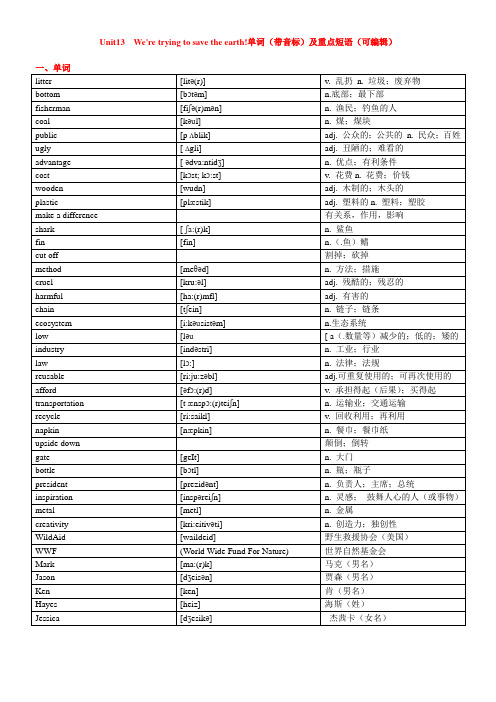
Unit13 We're trying to save the earth!单词(带音标)及重点短语(可编辑)一、单词litter [litə(r)] v. 乱扔n. 垃圾;废弃物bottom [bɔtəm] n.底部;最下部fisherman [fiʃə(r)mən] n. 渔民;钓鱼的人coal [kəu l] n. 煤;煤块public [pʌblik] adj. 公众的;公共的n. 民众;百姓ugly [ʌgli] adj. 丑陋的;难看的advantage [ədva:ntidʒ] n. 优点;有利条件cost [kɔst; kɔ:st] v. 花费n. 花费;价钱wooden [wudn] adj. 木制的;木头的plastic [plæstik] adj. 塑料的n. 塑料;塑胶make a difference 有关系,作用,影响shark [ʃa:(r)k] n. 鲨鱼fin [fin] n.(.鱼)鳍cut off 割掉;砍掉method [meθəd] n. 方法;措施cruel [kru:əl] adj. 残酷的;残忍的harmful [ha:(r)mfl] adj. 有害的chain [tʃein] n. 链子;链条ecosystem [i:kəu sistəm] n.生态系统low [ləu[ a(.数量等)减少的;低的;矮的industry [indəstri] n. 工业;行业law [lɔ:] n. 法律;法规reusable [ri:ju:zəbl] adj.可重复使用的;可再次使用的afford [əfɔ:(r)d] v. 承担得起(后果);买得起transportation [t ænspɔ:(r)teiʃn] n. 运输业;交通运输recycle [ri:saikl] v. 回收利用;再利用napkin [næpkin] n. 餐巾;餐巾纸upside down 颠倒;倒转gate [geIt] n. 大门bottle [bɔtl] n. 瓶;瓶子president [prezidənt] n. 负责人;主席;总统inspiration [inspəreiʃn] n. 灵感;鼓舞人心的人(或事物)metal [metl] n. 金属creativity [kri:eitivəti] n. 创造力;独创性WildAid [waildeid] 野生救援协会(美国)WWF (World Wide Fund For Nature) 世界自然基金会Mark [ma:(r)k] 马克(男名)Jason [dʒeisən] 贾森(男名)Ken [ken] 肯(男名)Hayes [heiz] 海斯(姓)Jessica [dʒesikə] 杰茜卡(女名)二、重点短语1. environment protection 1. 环境保护2.air pollution 2. 空气污染3.noise pollution 3. 噪音污染4.water pollution 4. 水污染5.public places; 5. 公共场所;公共地方6.mobile phone; 6. 手机;可移动电证7.art pieces 7. 艺术品8.the food chain 8. 食物链9.scientific studies 9. 科学研究10.the number of... 10. 的数目11.take part in 11. 参加12.take action;12. 采取行动;采取措施13.turn off =shut off 13. 关闭=14.play a part in... 14. 在中起作用15.make a difference;15. 起作用;有影响16.pay for;16. 付费;付出代价17. put sth. to good use =make good use of 17. 好好利用=18. pull down;18. 撤山;摧毁19. cut down;19. 砍到;削减20.cut off...;20. 把……砍断开;截断21.add up...;21. 把加起来;加起来22.clean up ... 22. 把打扫干净23.throw away...;、23. 把扔掉;丢掉、24.bring back;;24. 拿回;归还;恢复25.lead to;25. 通向;导致26.can ’t afford to do sth. 26. 小能承担做某事27.build sth. out of... 27. 用来建造某物28.be made of... 28. 被用制造成30.be famous for..... 30. 因而山名31.be full of ...;...=be filled with 31. 充满;装满=32. be good for ... 32. 对有好处33. be harmful to ... 33. 对有害34. (be) in danger 34. 处于危险状态之中35. in the last twenty to thirty years. 35. 在过去的20 至30 年中36.at the top of sth ... 36. 在的顶部37.instead of ;37. 代替;取代38.upside down;38. 上下颠倒;倒转。
人教版英语PEP英语九年级下册 Unit 13 We’re trying to save the e
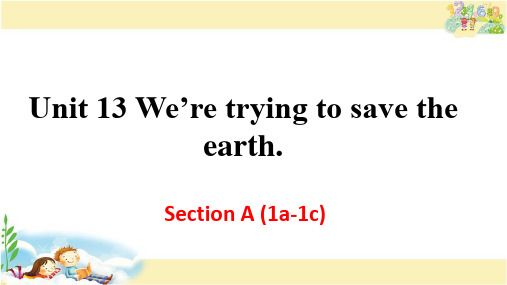
problem be
to ___c_lo_s_e_d_o_w_n___ the factories. Everyone should
solved?
help to ___c_l_e_an__u_p____the river.
Listen again and answer the questions.
water pollution
land pollution
Do you know what caused the pollution? What should we do to save the earth?
Presentation
1a Here are some words related to different kinds of pollution Write them in the box below. Then add more words.
What caused the People are throwing ____l_it_te_r_______ into the river.
problem?
Factories are putting ____w__a_st_e______ into the river.
How should the We should write to the __g_o_v_e_r_n_m__en_t__ and ask them
健康的饮食在帮助人们长寿方面起着非常大的作用。
Homework
1. Preview the conversation in 2d. 2. Do the exercises in students’ book.
Thank you!
Unit 13 We’re trying to save the earth!
Unit 13 We are trying to save the earth!教案

Unit 13 We’re trying to save the earth!教学目标:话题Topic:环境保护(Protecting the environment)功能Functions:能谈论环境污染和环境保护问题(Talk about pollution and environmental protection)We’re trying to save the earth.The river used to be so clean.The air is badly polluted.To cut down air pollution, we should take the bus or subway instead of driving.语法复习:Review of key structures能正确区分和使用以下语法结构:现在进行时、used to、被动语态、现在完成时、情态动词等We are trying to save the earth.The river used to be so clean.It was considered the nicest river in town.We should help save the sharks.词汇和常用表达Words & expressions1.能正确使用下列词汇(Curriculum words)bottom, fisherman, coal, advantage, industry, law, gate, bottle, president, work, metal, ugly, wooden, plastic, cruel, harmful, scientific, litter, cost, afford, recycle 2.能正确使用下列常用表达(Useful expressions)be harmful to, at the top of, the food, chain, take part in, turn off, pay for, take action, throw away, put sth. to good use, pull…down, upside down, bring back3.能认读下列词汇(Non-curriculum words)takeaway, bin, shark, fin, chain, ecosystem, reusable, transportation, napkin, inspiration, iron, creativity学习策略Strategies1.借助文章标题和插图对阅读篇章内容进行合理的预测2.能在阅读中借助上下文语境和构词特征猜测部分词汇的含义文化知识Culture了解环境污染情况问题和如何保护环境Section A 1 (1a-2d)Learning objectives:1. To learn and talk about air pollution, waste pollution and ways to solve the problems.2. To learn to use the sentence patterns.used to...but now…should do sth.3. To master key words and phrases:litter, bottom, fisherman, coal, ugly, advantage, cost, wooden, plastic, make a difference, lead to, instead ofI. Warming upShow the pictures to make some comparison and tell students the earth is polluted now.For example: (1) The factories that burn coal pollute the air with a lot of black smoke.(2) Factories put waste into the river.(3) People should throw away litter in the bin.(4)There are more cars on the road.Learn some new words.II. Work on 1aHere are some words related to different kinds of pollution. Write them in the box below. Then add more words.noise pollution air pollution water pollution____________ ___________ _________________________ ___________ _________________________ ___________ _________________________ ___________ _____________III. Listening1. Work on1b. Listen and complete the sentences.2. Listen again and answer the following questions.1)What does Tony want to do later this afternoon?He wants to go swimming with Mark in the river later this afternoon.2) How was the river in the past?It used to be so clean. It has been the nicest river in this town.3. 原文展示used to do sth. “过去常常……” 表示过去习惯性的动作但如今已不存在。
Uint13( We’re trying to save the earth!完整)

5. 情态动词 1) 情态动词本身有一定的词义,表示说话人的情绪、态度或语气,但不能单 独作谓语,只能与其他动词构成谓语。 常见的有:can (could), may (might), must, need, shall (should), will (would)等。 2) 情态动词无人称和数的变化, 后接动词原形。 否定式是在情态动词后面加not。 个别情态动词有过去式形式, 可用来表达更加客气、委婉的语气。 e.g. Ken can climb up the tress like a koala. Tracy could ride a bicycle when she was five years old. You mustn’t play with fire. It is dangerous.
1. We can’t afford to wait any longer to take action! afford v. 承担得起;提供, 给予 afford to do sth. (常与can, be ble to连用) 买得起;有足够的…… e.g. 我们付不起这个价钱。 We can’t afford to pay such a price. 2. …save electricity by turning off the lights when you leave a room. turning off 关掉 e.g. Please turn the television off before you go to bed. 睡觉前请关掉电视。 拓展:turn相关短语 turn around 转身 turn up 调高(音量) turn down 调低;拒绝 turn into 变成;进入 turn on 打开,发动 turn off 关掉,关闭 turn out to be 结果是 turn over 移交
九年级英语Unit13 课文翻译
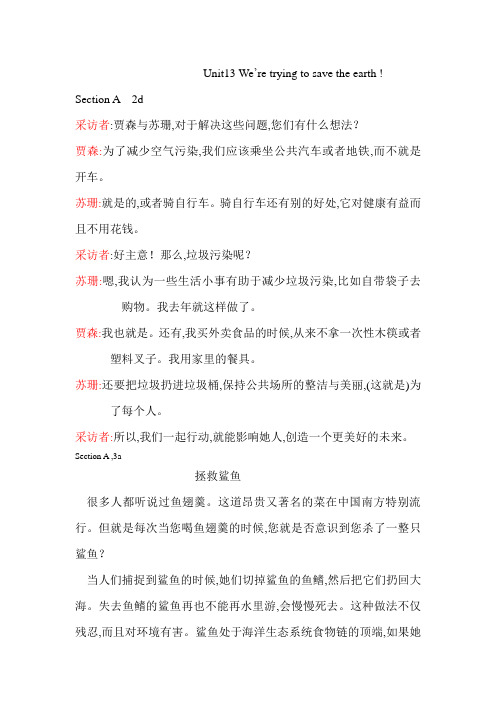
Unit13 We’re trying to save the earth ! Section A 2d采访者:贾森与苏珊,对于解决这些问题,您们有什么想法?贾森:为了减少空气污染,我们应该乘坐公共汽车或者地铁,而不就是开车。
苏珊:就是的,或者骑自行车。
骑自行车还有别的好处,它对健康有益而且不用花钱。
采访者:好主意!那么,垃圾污染呢?苏珊:嗯,我认为一些生活小事有助于减少垃圾污染,比如自带袋子去购物。
我去年就这样做了。
贾森:我也就是。
还有,我买外卖食品的时候,从来不拿一次性木筷或者塑料叉子。
我用家里的餐具。
苏珊:还要把垃圾扔进垃圾桶,保持公共场所的整洁与美丽,(这就是)为了每个人。
采访者:所以,我们一起行动,就能影响她人,创造一个更美好的未来。
Section A ,3a拯救鲨鱼很多人都听说过鱼翅羹。
这道昂贵又著名的菜在中国南方特别流行。
但就是每次当您喝鱼翅羹的时候,您就是否意识到您杀了一整只鲨鱼?当人们捕捉到鲨鱼的时候,她们切掉鲨鱼的鱼鳍,然后把它们扔回大海。
失去鱼鳍的鲨鱼再也不能再水里游,会慢慢死去。
这种做法不仅残忍,而且对环境有害。
鲨鱼处于海洋生态系统食物链的顶端,如果她们的数量下降得太多,将会给所有的海洋生物带来危害。
很多人认为鲨鱼永远不会濒临灭绝,因为她们就是食物链的最强者。
但事实上,每年有七百万的鲨鱼被捕杀与交易。
在过去的20年到30年,某些品种的鲨鱼数量下降了超过90%。
世界各地的环保组织,如野生救援协会与世界自然基金会,都在向公众宣讲“猎翅的(残忍)行为。
她们甚至已经呼吁政府立法停止鱼翅的销售。
到目前为止,没有任何科学研究表明,鱼翅对健康有好处,那么为什么要吃她们呢?帮助拯救鲨鱼吧!Section B , 2a重新思考重新使用,重新利用您经常扔掉您不在使用的东西不?您就是否曾想过这些东西还能很好地重新利用?如果您有一个充满创意的头脑,没有东西就是废品。
您可能从来没听说过艾米、海斯,但她就是一个非常不寻常的女性。
九年级英语Unit13 课文翻译
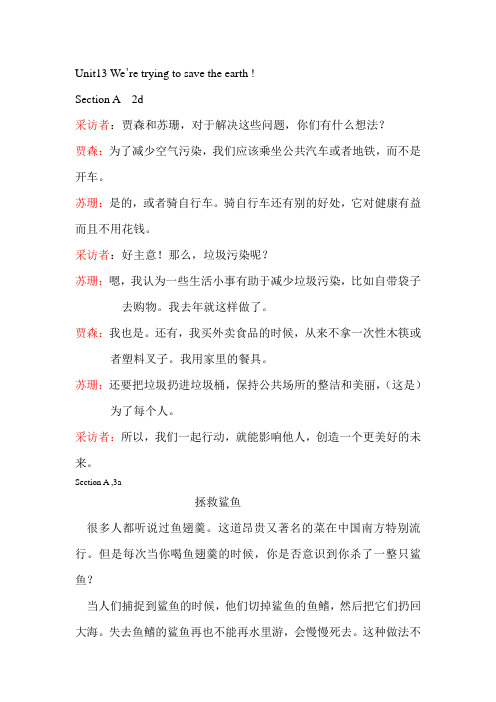
Unit13 We’re trying to save the earth !Section A 2d采访者:贾森和苏珊,对于解决这些问题,你们有什么想法?贾森:为了减少空气污染,我们应该乘坐公共汽车或者地铁,而不是开车。
苏珊:是的,或者骑自行车。
骑自行车还有别的好处,它对健康有益而且不用花钱。
采访者:好主意!那么,垃圾污染呢?苏珊:嗯,我认为一些生活小事有助于减少垃圾污染,比如自带袋子去购物。
我去年就这样做了。
贾森:我也是。
还有,我买外卖食品的时候,从来不拿一次性木筷或者塑料叉子。
我用家里的餐具。
苏珊:还要把垃圾扔进垃圾桶,保持公共场所的整洁和美丽,(这是)为了每个人。
采访者:所以,我们一起行动,就能影响他人,创造一个更美好的未来。
Section A ,3a拯救鲨鱼很多人都听说过鱼翅羹。
这道昂贵又著名的菜在中国南方特别流行。
但是每次当你喝鱼翅羹的时候,你是否意识到你杀了一整只鲨鱼?当人们捕捉到鲨鱼的时候,他们切掉鲨鱼的鱼鳍,然后把它们扔回大海。
失去鱼鳍的鲨鱼再也不能再水里游,会慢慢死去。
这种做法不仅残忍,而且对环境有害。
鲨鱼处于海洋生态系统食物链的顶端,如果他们的数量下降得太多,将会给所有的海洋生物带来危害。
很多人认为鲨鱼永远不会濒临灭绝,因为他们是食物链的最强者。
但事实上,每年有七百万的鲨鱼被捕杀和交易。
在过去的20年到30年,某些品种的鲨鱼数量下降了超过90%。
世界各地的环保组织,如野生救援协会和世界自然基金会,都在向公众宣讲“猎翅的(残忍)行为。
他们甚至已经呼吁政府立法停止鱼翅的销售。
到目前为止,没有任何科学研究表明,鱼翅对健康有好处,那么为什么要吃他们呢?帮助拯救鲨鱼吧!Section B , 2a重新思考重新使用,重新利用你经常扔掉你不在使用的东西吗?你是否曾想过这些东西还能很好地重新利用?如果你有一个充满创意的头脑,没有东西是废品。
你可能从来没听说过艾米.海斯,但她是一个非常不寻常的女性。
人教PEP版初中九年级英语下册 《We're trying to save the earth!》

感悟中考
5. (2013湖北宜昌)—Atpresent,
oneofthebestwaystostudyisworkingingroups.
—
Morechances_______tostudentstolearnfromeac
4. --MayIspeaktoJohn?
--Sorry, he__________(go) toNewYork. hewillbebackhinastwgoondeays.
5. --DidyougotoJack'sbirthday?
--No,I______________(notinvite). wasnotinvited
Joe:Howmanypeople___t_o_o_k (take) part? Ken:I__th_i_n_k(think) morethan1,000people _____c(caommee) tohelpout. Joe:That’sfantastic! Iguesseveryoneinthiscity is_____tr(ytrinyg) toimprovetheenvironment. Ken:Yes, wecan'taffortto____w_a(itwait) any longertotakeaction!
➢twice, recently, sofar, ➢for+时间段, since+时间点/从句, ➢inthepast+时间名词, ➢inthelast+时间名词。
(4)过去分词的构成: ①一般情况下在动词词尾加-ed。如:work-worked。 ②以e结尾的动词后只加-d。如:close--closed。 ③以辅音字母+y结尾的动词,应将y改为i再加ed。 如:study--studied。 ④以重读闭音节结尾的动词,要双写末尾的辅音 字母再加-ed。如:stop--stopped。 ⑤不规则动词的过去分词:AAA型;AAB型; ABA型;ABB型;ABC型。
Unit 13 We're trying to save the earth

Unit 13 We’re trying to save the earth .Period 5 Section B (2a-2e)I.考点聚焦Do you often throw away things you don’t need anymore ?考点1 求同辩异:throw away /give away /put away1.-Sam , let’s ______ these old things . I don’t need them anymore.-No. We an try to put them to good use .A.pull downB. fix upC. hand outD. throw away2.我收好的那本书是一本新书。
The book that I _____________ is new one.Have you ever thought about how these things can actually be put to good use ? 考点2联想记忆:use /put sth to good use3.去年莉莉充分利用假期学习了一些电脑方面的知识。
Lily _______ her vacation ________to learn some knowledge about computers last year.4.你最好把课余时间利用好。
You’d better _______ your spare time _______ _______ _______ .The windows and doors come from old buildings around her town that were pulled down.考点3 求同辩异:pull/ pull down5.拆房容易盖房难。
It is easier to _______ _______ than to build up .6.如果我们齐心协力,就能改善环境。
Unit 13 We are trying to save the earth !section A grammer focos-4c

I can’t afford ____ him an expensive birthday present.
A. to buy
B. buying C. for buying D. buy
【当堂检测】
B. • 1.The girl always has some money to ___ snacks.
• 3. (2013湖北随州)
• –How does Jack usually go to work?
• —He ______ drive a car, but now he ______ there to lose weight.
• A. used to; is used to walk
• C. was used to; is used to walk • 4. (2013湖北宜昌)
自学自查:根据汉语提示完成单词。
1). The shoes are so expensive that I can’t ___a_f_fo_r_d_____(买得起) them.
2). We should use___r_e_u_s_a_b_le___ (可重复使用的)chopsticks when we eat outside.
B. was used to; is used to walking
√D. use present, one of the best ways to study is working in groups.
We can ________________________________.
① turn off the lights when… ② use the paper bags.. ③walk to school……
河南省九年级英语全册Unit13Wearetryingtosavetheearth考点题型与解题方法

河南省九年级英语全册Unit13Wearetryingtosavetheearth考点题型与解题方法单选题1、Remember ________ the light when you leave.A.closeB.to closeC.turning offD.to turn off答案:D句意:离开时记得关灯。
考查动词辨析,close关;turn off关闭(电源)。
根据“the light”可知应该是关灯,用turn off。
再结合remember to do sth“记得去做某事”,故选D。
2、—Many DIY cards ________ to mothers on Mother’s Day every year.—How creative!A.is sendingB.are sendingC.is sentD.are sent答案:D句意:——每年母亲节都会给妈妈们寄很多DIY卡片。
——多么有创意!考查被动语态。
分析句子可知,主语“Many DIY cards”和谓语“send”之间是被动关系,用被动语态be done,主语是名词复数,be动词用are。
故选D。
3、—Mmm…Delicious. What is it?—It ________ zongzi, Tony. It’s a traditional food in China.A.callsB.is calledC.calledD.was called答案:B句意:——嗯……好吃。
这是什么?——它叫粽子,托尼。
这是中国的传统食物。
考查被动语态。
根据“What is it?”可知,此处回答使用一般现在时,It指代询问的这个东西,与动词call之间为被动关系,使用被动语态,It为单数,结构为is done。
故选B。
4、—Have you seen Dr Adams recently?—No. He _________ Hong Kong for an international meeting.A.has gone inB.has been inC.has gone toD.has been to答案:C句意:——你最近见过亚当斯博士吗?——没有。
- 1、下载文档前请自行甄别文档内容的完整性,平台不提供额外的编辑、内容补充、找答案等附加服务。
- 2、"仅部分预览"的文档,不可在线预览部分如存在完整性等问题,可反馈申请退款(可完整预览的文档不适用该条件!)。
- 3、如文档侵犯您的权益,请联系客服反馈,我们会尽快为您处理(人工客服工作时间:9:00-18:30)。
46.so far当目前为止,迄今为止
47. scientific studies科学研究
48.be against (doing)反对做…
49. can’t afford to do sth不能承担做某事
28.plastic forks塑料叉
29.throw rubbish in the bins把垃圾扔进箱里
30.keep public places clean保持公共场所干净
31.hear of/about听说
32.a bowl of shark fin soup一碗鱼翅
33.in southern China在中国的南部
50.take actions采取行动
51.begin with以…开始
52. turn off the lights关灯
53. pay for付费;付出代价
54. add up把......加起来加起来
55. stop riding in cars停止开车
56.paper napkins纸巾
57. ride in cars开车出行
14.burn coal烧煤
15.too much waste and rubbish太多的垃圾
16.lead to通向;导致
17.take part in参加
18. play a part in在......中起作用
19. turn …into把…转变为
20. clean up把......打扫干净
40. (be) in danger处于危险状态之中
41. be full of充满......;装满......= be filled with
42. in the last 20 to 30 years.在过去的20至30年中
43.the public公众,群众
44.develop laws to stop the sale of shark fins建全法律去阻止鱼鳍买卖
64.pull down拆下;摧毁
65.upside down上下颠倒,倒转
66. be an inspiration to sb成为…的榜样
67.win a prize获奖
68. set up a website to sell them online建立一个网站去网上售卖他们
69.open/set up a small business开一个小商店,做一个小生意
76.put…on the top of把…放在…的顶端
77.an online business网上生意,网店
nd pollution土地污染
79.get worse and worse变得越来越严重
34.cut off把......砍断开;截断
35.throw back into扔回
36.be harmful to…对…有害
37.at the top of在…的顶部
38. not only ... but also ...不仅......而且......
39. the food chain in the ocean’s ecosystem海洋生态系统中的食物链
58. turn off the shower关掉喷头
59.recycle books and paper回收书和废纸
60.think about考虑
61.put sth to good use好好利用
62.build sth . out of用......来建造某物
63. be made of/from被用......制造成
6. mobile phones手机;可移动电话
7.the bottom of .......的底部
8. no more/longer不再
9. throw …into把…扔进
10.put …into把…放进
11.close down关闭
12.be full of rubbish满是垃圾
13.make a different to在...有影响
70. be known/famous for因......而出名
71. art pieces艺术品
72.the importance of.....的重要性
73. bring back恢复;使想起
74.the number of ... ......的数目
75.a (small/large) number of…少量/很多
Unit13 We are trying to save the earth!
1. environmental protection环境保护
2. air pollution空气污染
3. noise pollution噪音污染
4. water pollution水污染
5. in public在公共场所;在公共地方
21. throw away把......扔掉;丢掉
22.be able to有能力做
23.cut down砍到;削减
24. instead of代替;取代
25.bike riding骑自行车(名词词组)
26.waste pollution浪费污染
27.wooden chopsticks(一次性)木筷
